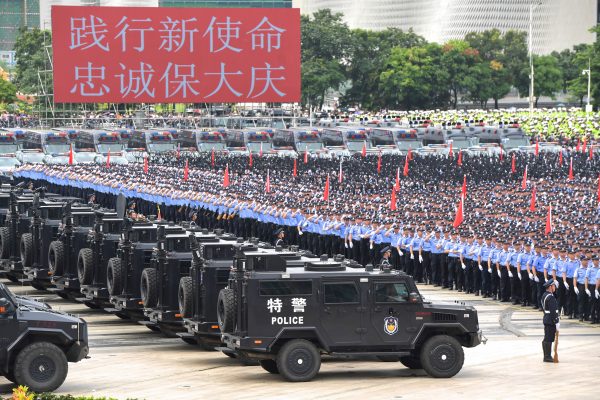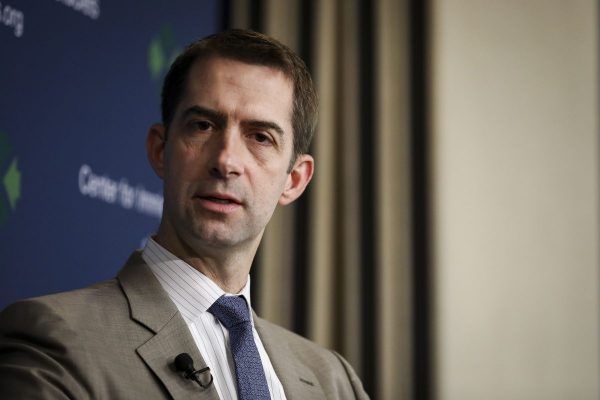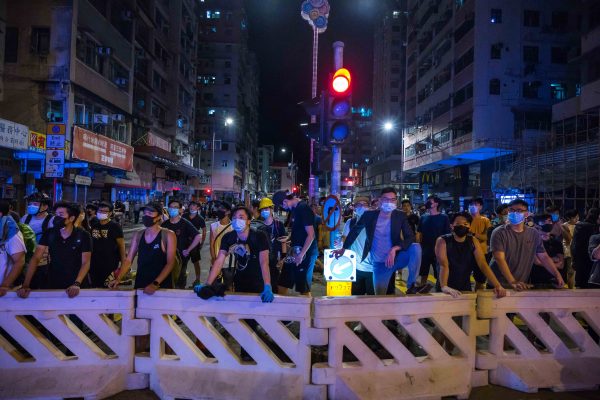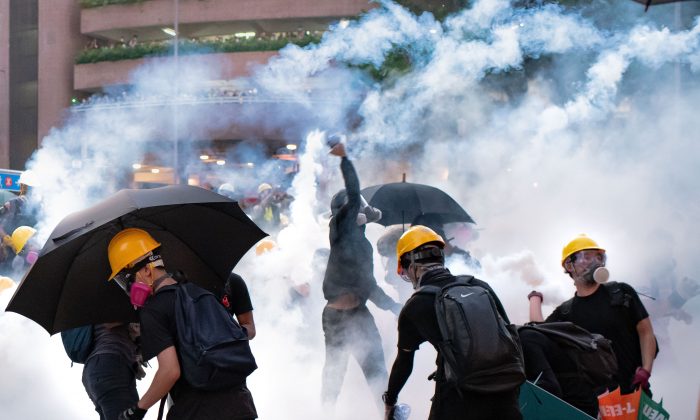As Beijing escalates its tough rhetoric in condemning Hong Kong protesters, U.S. lawmakers are raising the possibility of sanctions on China.
Hong Kong mass protests have entered their third month as locals continue to call for the withdrawal of a bill that would allow the Chinese regime to transfer individuals to the mainland to face trial in its opaque legal system.
Many fear that the bill would signal the erosion of the city’s autonomy, which was promised by Beijing upon its transfer of sovereignty from Britain in 1997.
In recent weeks, protesters’ relentless rallies and marches—often contained by local police firing tear gas, rubber bullets, and sponge grenades at crowds—in addition to an organized strike on Aug. 5 that paralyzed the city after thousands took leave from work, have drawn the ire of Beijing.


This photo taken on Aug. 6, 2019 shows Chinese paramilitary police officers taking part in a drill in Shenzhen in China’s southern Guangdong province, across the border from Hong Kong.
During an Aug. 7 symposium held in Shenzhen city by the Hong Kong and Macau Affairs Office and the Liaison Office, Beijing’s representative office in the territory, a senior official called the Hong Kong protests “a color revolution” that needed to be quelled, using a term that refers to popular uprisings in former Soviet countries.
“It is now a ‘life-or-death’ fight for the very future of Hong Kong. … There is no room for retreat,” said Zhang Xiaoming, director of the Hong Kong and Macau Affairs Office.
During an Aug. 7 symposium held in Shenzhen city by the Hong Kong and Macau Affairs Office and the Liaison Office, Beijing’s representative office in the territory, a senior official called the Hong Kong protests “a color revolution” that needed to be quelled, using a term that refers to popular uprisings in former Soviet countries.
“It is now a ‘life-or-death’ fight for the very future of Hong Kong. … There is no room for retreat,” said Zhang Xiaoming, director of the Hong Kong and Macau Affairs Office.
Shenzhen, in southern China, is just across the border from Hong Kong.
He warned that Beijing authorities have “ample methods” and “sufficient strength” to “promptly settle any possible turmoil.”
His words were the Chinese regime’s latest hint about using force to suppress the protests.
The Chinese military’s garrison in Hong Kong released a video on July 31 of troops participating in an “anti-riot” exercise, firing at an unarmed group of people.
He warned that Beijing authorities have “ample methods” and “sufficient strength” to “promptly settle any possible turmoil.”
His words were the Chinese regime’s latest hint about using force to suppress the protests.
The Chinese military’s garrison in Hong Kong released a video on July 31 of troops participating in an “anti-riot” exercise, firing at an unarmed group of people.
A soldier is seen holding a banner with the words “Warning, stop charging or we use force,” similar to what Hong Kong police have used during protests.
On Aug. 6, more than 12,000 police officers gathered for a drill in Shenzhen to “maintain national political security and social stability.”
On Aug. 6, more than 12,000 police officers gathered for a drill in Shenzhen to “maintain national political security and social stability.”
The video footage was posted onto the Shenzhen police’s official Weibo, the Chinese equivalent of Twitter, showing police in riot gear clashing with civilians dressed in black shirts and yellow construction helmets—the trademark attire of Hong Kong demonstrators.
Asked by a reporter at an Aug. 6 press briefing whether Beijing would deploy troops to “control” the Hong Kong protests, Yang Guang, spokesperson for Hong Kong and Macau Affairs Office, did not give a straight answer, but said that the People’s Liberation Army (PLA) is “a strong force that defends every inch of its sacred territory.”
Gordon G. Chang, China expert and author of “The Coming Collapse of China,” told The Epoch Times in an Aug. 5 interview that deploying troops would be a last resort for the Chinese leadership.
“Hong Kong is not armored-car country,” Chang said.
“The PLA … and the People’s Armed Police would be in a quagmire [if they were deployed], because you’ve got kids [protesters] who are willing to die. This would be an awful situation—horrific.”
He said the communist regime may quell protests with force if it believed that “the Hong Kong protests [were] creating a contagion, inspiring people in the mainland to protest.”
Chinese dictator Xi Jinping may choose this route “if he feels the existence of the Communist Party is at stake,” Chang said.
Asked by a reporter at an Aug. 6 press briefing whether Beijing would deploy troops to “control” the Hong Kong protests, Yang Guang, spokesperson for Hong Kong and Macau Affairs Office, did not give a straight answer, but said that the People’s Liberation Army (PLA) is “a strong force that defends every inch of its sacred territory.”
Gordon G. Chang, China expert and author of “The Coming Collapse of China,” told The Epoch Times in an Aug. 5 interview that deploying troops would be a last resort for the Chinese leadership.
“Hong Kong is not armored-car country,” Chang said.
“The PLA … and the People’s Armed Police would be in a quagmire [if they were deployed], because you’ve got kids [protesters] who are willing to die. This would be an awful situation—horrific.”
He said the communist regime may quell protests with force if it believed that “the Hong Kong protests [were] creating a contagion, inspiring people in the mainland to protest.”
Chinese dictator Xi Jinping may choose this route “if he feels the existence of the Communist Party is at stake,” Chang said.

Sen. Tom Cotton (R-Ark.) at a border security discussion hosted by Center for Immigration Studies in Washington on July 30, 2019.
US Response
U.S. Senator Tom Cotton (R-Ark.) said that “the United States will be compelled to reassess our relationship with China in fundamental ways” should the Chinese regime choose to respond to the Hong Kong protests with military force.
“The Tiananmen Square massacre highlighted the Chinese Communist Party’s brutality and treachery, which they have employed for thirty years to steal our jobs and threaten our security,” the senator said in a statement, referring to Beijing’s decision to send troops to suppress student protesters at Tiananmen Square in 1989, where thousands were killed.
“If Beijing cracks down on Hong Kong, the United States ought not make the same mistake again.”
He said that should the Chinese regime impose martial law on the city, the U.S. government should be prepared to respond in six ways:
- halt trade negotiations with China;
- sanction senior Chinese Communist Party officials;
- bar Party leaders and their families from entering the United States;
- curtail student visas for Chinese nationals;
- demand the expulsion of Chinese officials from leadership positions in international organizations; and
- revise U.S. legislation that grants Hong Kong special trading privileges.

Tom Cotton
✔@SenTomCotton
Aug 7, 2019
The Chinese Communist Party is preparing for a violent crack-down on civilian protestors in Hong Kong. If Beijing imposes martial law in Hong Kong, there must be serious consequences.
https://www.scmp.com/news/china/military/article/3021597/chinese-police-mass-12000-anti-riot-officers-shenzhen-drill …

Chinese police mass 12,000 anti-riot officers in Shenzhen for drill
Security forces shown in live broadcast tackling ‘demonstrators’ who wear Hong Kong-style garb – ‘anti-mob’ tactics are in readiness for the 70th anniversary of People’s Republic.scmp.com

Tom Cotton
✔@SenTomCotton
Tiananmen Square was just 30 years ago. America didn’t respond strongly enough when peaceful protesters were gunned down and run over by Chinese tanks. We won’t make the same mistake if the CCP moves against Hong Kong.

Chinese police mass 12,000 anti-riot officers in Shenzhen for drill
Security forces shown in live broadcast tackling ‘demonstrators’ who wear Hong Kong-style garb – ‘anti-mob’ tactics are in readiness for the 70th anniversary of People’s Republic.scmp.com

Tom Cotton
✔@SenTomCotton
Tiananmen Square was just 30 years ago. America didn’t respond strongly enough when peaceful protesters were gunned down and run over by Chinese tanks. We won’t make the same mistake if the CCP moves against Hong Kong.
https://www.cotton.senate.gov/?p=press_release&id=1192 …

Cotton Warns Chinese Communists Against Intervening in Hong Kong Protestscotton.senate.gov
376
1:00 AM - Aug 7, 2019
Twitter Ads info and privacy
171 people are talking about this
China’s Foreign Ministry spokesperson Hua Chunying, at a regular press briefing on Aug. 7, slammed Cotton and other U.S. politicians, questioning the lawmakers’ “true intentions behind the Hong Kong issue.”

Cotton Warns Chinese Communists Against Intervening in Hong Kong Protestscotton.senate.gov
376
1:00 AM - Aug 7, 2019
Twitter Ads info and privacy
171 people are talking about this
China’s Foreign Ministry spokesperson Hua Chunying, at a regular press briefing on Aug. 7, slammed Cotton and other U.S. politicians, questioning the lawmakers’ “true intentions behind the Hong Kong issue.”
She responded similarly to U.S. House Speaker Nancy Pelosi’s comments in support of the protesters.
Pelosi said in an Aug. 6 statement, “The people of Hong Kong deserve the true autonomy that was promised, with the full rights guaranteed by the Hong Kong Basic Law [the city’s constitution] and international agreements.” Protestors stand off against riot police after a student’s arrest at Sham Shui Po district on Aug. 6, 2019 in Hong Kong, China.
Protestors stand off against riot police after a student’s arrest at Sham Shui Po district on Aug. 6, 2019 in Hong Kong, China.
Pelosi said in an Aug. 6 statement, “The people of Hong Kong deserve the true autonomy that was promised, with the full rights guaranteed by the Hong Kong Basic Law [the city’s constitution] and international agreements.”
 Protestors stand off against riot police after a student’s arrest at Sham Shui Po district on Aug. 6, 2019 in Hong Kong, China.
Protestors stand off against riot police after a student’s arrest at Sham Shui Po district on Aug. 6, 2019 in Hong Kong, China. Travel Warnings
On Aug. 7 evening, the U.S. State Department issued a travel advisory for Hong Kong, warning travelers to “exercise increased caution” due to civil unrest.
It warned that some protests have “turned confrontational or resulted in violent clashes,” sometimes spilling into neighborhoods outside of planned demonstrations.
Australia also issued a travel warning for Hong Kong on Aug. 7, saying people should “exercise a high degree of caution.”
“There is a risk of violent confrontation between protesters and police, or criminally linked individuals, particularly at unauthorized protests,” said Australia’s Department of Foreign Affairs and Trade (DFAT) in the advisory.
Britain, Japan, Ireland, and Singapore have issued similar travel warnings since July.
The travel advisory came after Hong Kong police clashed on Aug. 6 with hundreds of protesters in the district of Sham Shui Po.
Locals had gathered outside the nearby police station to protest the police’s arrest of a local university student union leader.
Police said the Hong Kong Baptist University student was detained on suspicion of possessing offensive weapons—10 laser pointers.
Police said the Hong Kong Baptist University student was detained on suspicion of possessing offensive weapons—10 laser pointers.
The university’s student union, in a Facebook post, accused the police of fabricating the charges in order to arrest people arbitrarily and called for the student leader’s immediate release.
Australia’s DFAT said protests had become more unpredictable and were expected to continue.
Australia’s DFAT said protests had become more unpredictable and were expected to continue.
The advisory strongly recommended that travelers avoid large public gatherings, adding that the risk was greater at night and on weekends.
Hong Kong police have arrested 568 people and fired around 1,800 tear gas canisters since mass protests began in June, according to an Aug. 6 police briefing.
Hong Kong police have arrested 568 people and fired around 1,800 tear gas canisters since mass protests began in June, according to an Aug. 6 police briefing.

Aucun commentaire:
Enregistrer un commentaire